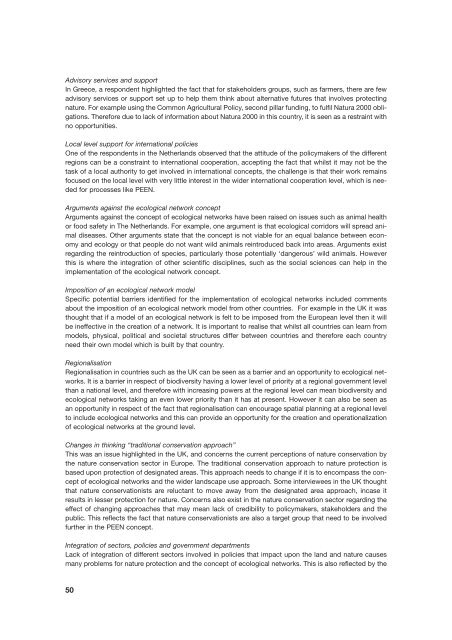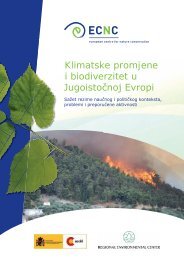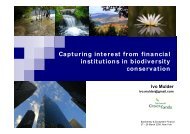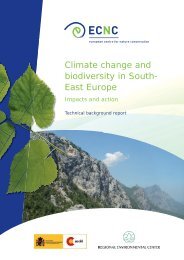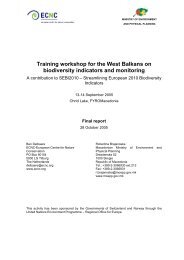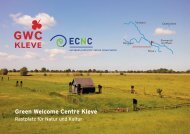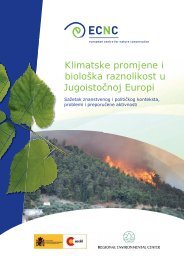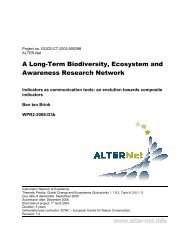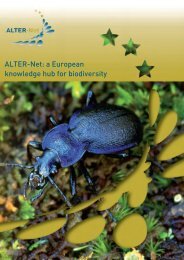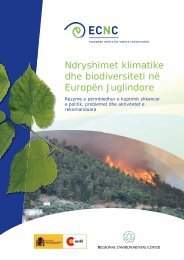2005 - Communicating the Pan-European Ecological Network - ECNC
2005 - Communicating the Pan-European Ecological Network - ECNC
2005 - Communicating the Pan-European Ecological Network - ECNC
Create successful ePaper yourself
Turn your PDF publications into a flip-book with our unique Google optimized e-Paper software.
Advisory services and supportIn Greece, a respondent highlighted <strong>the</strong> fact that for stakeholders groups, such as farmers, <strong>the</strong>re are fewadvisory services or support set up to help <strong>the</strong>m think about alternative futures that involves protectingnature. For example using <strong>the</strong> Common Agricultural Policy, second pillar funding, to fulfil Natura 2000 obligations.Therefore due to lack of information about Natura 2000 in this country, it is seen as a restraint withno opportunities.Local level support for international policiesOne of <strong>the</strong> respondents in <strong>the</strong> Ne<strong>the</strong>rlands observed that <strong>the</strong> attitude of <strong>the</strong> policymakers of <strong>the</strong> differentregions can be a constraint to international cooperation, accepting <strong>the</strong> fact that whilst it may not be <strong>the</strong>task of a local authority to get involved in international concepts, <strong>the</strong> challenge is that <strong>the</strong>ir work remainsfocused on <strong>the</strong> local level with very little interest in <strong>the</strong> wider international cooperation level, which is neededfor processes like PEEN.Arguments against <strong>the</strong> ecological network conceptArguments against <strong>the</strong> concept of ecological networks have been raised on issues such as animal healthor food safety in The Ne<strong>the</strong>rlands. For example, one argument is that ecological corridors will spread animaldiseases. O<strong>the</strong>r arguments state that <strong>the</strong> concept is not viable for an equal balance between economyand ecology or that people do not want wild animals reintroduced back into areas. Arguments existregarding <strong>the</strong> reintroduction of species, particularly those potentially ‘dangerous’ wild animals. Howeverthis is where <strong>the</strong> integration of o<strong>the</strong>r scientific disciplines, such as <strong>the</strong> social sciences can help in <strong>the</strong>implementation of <strong>the</strong> ecological network concept.Imposition of an ecological network modelSpecific potential barriers identified for <strong>the</strong> implementation of ecological networks included commentsabout <strong>the</strong> imposition of an ecological network model from o<strong>the</strong>r countries. For example in <strong>the</strong> UK it wasthought that if a model of an ecological network is felt to be imposed from <strong>the</strong> <strong>European</strong> level <strong>the</strong>n it willbe ineffective in <strong>the</strong> creation of a network. It is important to realise that whilst all countries can learn frommodels, physical, political and societal structures differ between countries and <strong>the</strong>refore each countryneed <strong>the</strong>ir own model which is built by that country.RegionalisationRegionalisation in countries such as <strong>the</strong> UK can be seen as a barrier and an opportunity to ecological networks.It is a barrier in respect of biodiversity having a lower level of priority at a regional government levelthan a national level, and <strong>the</strong>refore with increasing powers at <strong>the</strong> regional level can mean biodiversity andecological networks taking an even lower priority than it has at present. However it can also be seen asan opportunity in respect of <strong>the</strong> fact that regionalisation can encourage spatial planning at a regional levelto include ecological networks and this can provide an opportunity for <strong>the</strong> creation and operationalizationof ecological networks at <strong>the</strong> ground level.Changes in thinking “traditional conservation approach’’This was an issue highlighted in <strong>the</strong> UK, and concerns <strong>the</strong> current perceptions of nature conservation by<strong>the</strong> nature conservation sector in Europe. The traditional conservation approach to nature protection isbased upon protection of designated areas. This approach needs to change if it is to encompass <strong>the</strong> conceptof ecological networks and <strong>the</strong> wider landscape use approach. Some interviewees in <strong>the</strong> UK thoughtthat nature conservationists are reluctant to move away from <strong>the</strong> designated area approach, incase itresults in lesser protection for nature. Concerns also exist in <strong>the</strong> nature conservation sector regarding <strong>the</strong>effect of changing approaches that may mean lack of credibility to policymakers, stakeholders and <strong>the</strong>public. This reflects <strong>the</strong> fact that nature conservationists are also a target group that need to be involvedfur<strong>the</strong>r in <strong>the</strong> PEEN concept.Integration of sectors, policies and government departmentsLack of integration of different sectors involved in policies that impact upon <strong>the</strong> land and nature causesmany problems for nature protection and <strong>the</strong> concept of ecological networks. This is also reflected by <strong>the</strong>50


